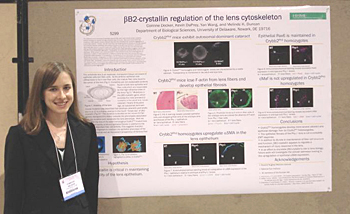
With a concentration in biotechnology, Decker said she came to Delaware open to doing any kind of research.
“After meeting Dr. Duncan and learning about her lab, I was interested by the clinical applications of cataract research. I wasn't familiar with eye development or the lens, but I like studying biology on the molecular level so this project seemed like a good fit.
Duncan's research team looks at the development of the ocular lens, which is comprised of two general cell types-ones that maintain the ability to proliferate, and terminally differentiated ones. The lens is a particularly good tissue for the study of cellular differentiation since the two cell types are spatially separate and morphologically dissimilar. Further, since abnormalities in lens development do not affect the survival of laboratory animals, it is possible to genetically manipulate pathways controlling lens formation without fear of lethality.
“After working on this project for a year, I've really become fascinated by how altering one protein has massive effects on the entire lens,” Decker said. “Crystallins are necessary to maintain the refractive properties of the lens, but additional functions of these proteins are not well characterized.
“The mice I study,” she continued, “produce a variant betaB2-crystallin, causing severe cataract formation in lens fiber cells. I found that, in addition to developing cataracts, these mice undergo profound changes in the lens epithelium. We don't know what leads to this epithelial damage and aberrant protein expression, but it is similar to a wound-healing response that occurs in humans following primary cataract surgery. “
The grant funding will enable Decker to analyze the expression of particular proteins in the lens in an attempt to characterize the pathway leading to loss of the epithelial phenotype. Hopefully, this project will further define the functions of betaB2-crystallin in lens biology and possibly lead to a better understanding of the pathway that leads to secondary cataract in humans.
Fight for Sight was founded in 1946 by a Brooklyn native, Mildred Weisenfeld. Faced with the degenerative eye disease, Retinitis Pigmentosa, she was shocked to learn that research into the causes and cures of vision diseases and disorders was virtually nonexistent.
The mission of Fight for Sight is to support vision research to find the causes and cures for blindness and to help save the sight of children through support of pediatric eye centers. Today Fight for Sight is recognized as an international leader in the battle for the preservation and restoration of sight through research.
Article by Beth Thomas


